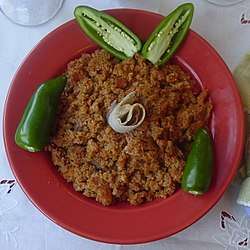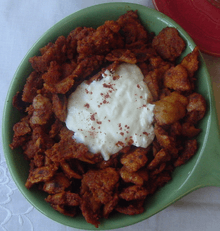Fit-fit
Fit-fit or fir-fir (Ge'ez: ፍርፍር firfir; ፍትፍት fitfit), (Oromo: chechebsaa), is an Eritrean and Ethiopian food typically served for breakfast. It is generally made with shredded flat bread, spiced clarified butter, and the hot spice berbere. There are two major varieties of fit-fit depending on the type of flatbread being used: the sourdough injera and the unleavened kitcha.
 | |
| Type | Bread |
|---|---|
| Course | Breakfast |
| Place of origin | Ethiopia and Eritrea |
| Main ingredients | Niter kibbeh |
| Variations | Injera fit-fit, kitcha fit-fit |
Injera fit-fit
Injera fit-fit (var. enjera fetfet;[1] also taita fit-fit in Tigrinya) is a combination of shredded injera, berbere, onions, and clarified butter. Variations on this basic recipe are common[1] in which the name of the additional item is commonly used as a prefix. For instance, if one were to add shiro (chickpeas puree), the resulting dish would be called shiro fit-fit. If one were to add broth (mereq) it would be called mereq fit-fit.
In Eritrea, leftover meat sauces (zighni or tsebhi) are often added to injera fit-fit and served for breakfast with raw chili peppers and yoghurt on the side. Similarly, in Ethiopia, leftover wat is used as a main ingredient along with injera.
Injera fit-fit can be eaten with a spoon when served in a bowl or eaten with the right hand when served atop of another piece of injera as is typical in Ethiopian or Eritrean cuisine.
Kitcha fit-fit

Kitta fer-fer (variations in Ethiopia: kita fer-fer, kita fir-fir; widely known by its Oromiffa name chechebsa) is a combination of shredded kitcha (Tigrinya) or kitta (Amharic), berbere, and clarified butter.[1][2] Kitta fit-fit is sometimes eaten with plain yogurt (urgo in Amharic and rug-o in Tigrinya).
Unlike most Ethiopian foods, kitta fer-fer is eaten with a utensil (usually a spoon). A dry variation is called kitcha in Tigrinya (or kitta in Amharic).
See also
- List of African dishes
- List of bread dishes
- List of Ethiopian dishes and foods
References
- Federal Ministry of Health (Ethiopia) (September 2008). "Glossary" (PDF). National Guidelines for HIV/AIDS and Nutrition. Pronutrition.org. p. 7. Archived from the original (PDF) on 2012-03-26.
- Sula, Mike (September 17, 2009). "One bite: chechebsa". Chicago Reader. Retrieved June 28, 2011.